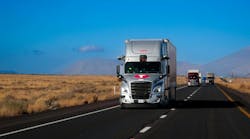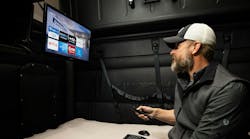With revenues of $12.4-billion, 2004 was the best year ever for the Freightliner Group, and 2005 is heading for a similar performance, according to Rainer Schmueckle, president & CEO of Freightliner LLC, the North American arm of DaimlerChrysler’s Commercial Vehicle Division.
The Freightliner Group includes commercial vehicle manufacturers Freightliner, Sterling, Western Star, American LaFrance and Thomas Build Buses, as well as Detroit Diesel Corp. and Axle Alliance Co., a maker of proprietary axles for the various Freightliner operations.
Both demand and order intake from new medium- and heavy-duty trucks remain strong, and 2005 sales totals should surpass 2004 totals, he said at a recent press conference.
DaimlerChrysler’s efforts to install more proprietary components in its North American commercial vehicle operations continues to gain ground, he said. Last year Detroit Diesel Series 60 and Mercedes-brand MBE 4000 diesels powered 70% of the groups’ heavy-duty trucks, according to Schmueckle. Market penetration of the medium-duty MBE 900 has grown from 18% in 2001 to 33% last year, leading the company to begin installation of a new MBE 900 assembly line at Detroit Diesel’s Redford, MI, plant. The use of proprietary axles has grown from 6% in 2003 to 18% in 2004 and is forecast to double this year, the Freightliner CEO said.
While the company “remains committed to continue offering secondary engines, the landscape of the market has changed forever,” and Freightliner is committed to “proving the value of drivetrain integration,” Schmueckle said.
Addressing an anticipated pre-buy of trucks by fleets trying to avoid 2007 low-emissions diesels, Schmueckle said he has “some hope that the pre-buy may not be so bad.”
For one, truck and component manufacturers are unlikely to expand production capabilities, meaning that output will be fixed at current levels and truck makers will not be able to fulfill major pre-buy orders, he said. Also fleets that extended trade cycles to avoid buying 2002 diesels learned that it was “very expensive to get outside of regular trade cycles,” he added.
Longer lead time to develop the low-emissions technology for 2007 should also calm fleet fears over engine reliability that contributed to the 2002 pre-buy, and Schmueckle believes that there is some hope for government incentives for those moving to the new engines. Continued economic health should also offset a large pre-buy, he said.


